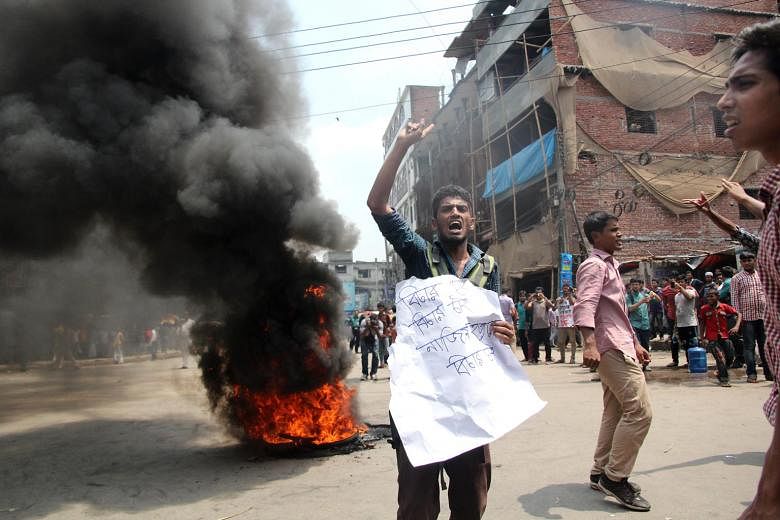The brutal hacking to death on Wednesday of a young secular blogger Nazimuddin Samad by machete-wielding assailants at a crowded square in the Bangladeshi capital Dhaka is a reminder that extremists are gaining ground in the world's third-largest Muslim-majority nation.
Mr Samad, a 26-year-old law student, was the sixth such victim of Islamists to be killed since February last year, confirming that a reign of terror has been unleashed against diversity of expression and opinion.
A disturbing pattern of anyone opposing organised religion, militancy and fundamentalist ideology being openly added by terrorists to their hit lists, and then getting executed in public places, poses an existential threat to Bangladesh, which is constitutionally a secular republic.
Political violence and instability have been endemic to this South Asian country since it broke away from Pakistan in 1971, with military coups d'etat, disputed elections and fierce rivalries among civilian politicians spilling into the streets and bringing life to a standstill.
Yet, even for a nation inured to crises and where democracy is still nascent, the present threat posed by resurgent extremists is of a different dimension altogether.
Targeted assassinations of atheists and secularist intellectuals are the product of a dangerous confluence of two virulent trends taking hold in Bangladeshi society.

The first malady is the congenital strain of Islamist refusal to accept the formation of Bangladesh itself. The front-line right-wing party, Jamaat-e-Islami, collaborated with the Pakistani military during the 1971 liberation war and was complicit in genocidal war crimes.
Having failed to prevent the creation of Bangladesh, this mainstream Islamist movement regrouped and formed an alliance with the Bangladeshi army. It accumulated power during spells of direct military rule and military- supported civilian governments in Dhaka by brainwashing and mobilising young Bangladeshis to hate the secular polity, oppress women, and demand implementation of syariah law.
Even as the founding mothers and fathers of Bangladesh had envisaged a syncretic national identity which embraced Hindu, Shi'ite, Sufi and other sectarian minorities and forged a community based on shared Bengali linguistic heritage, the Islamists spread bigoted Saudi Arabian-style Wahhabi poison and plotted ethnic cleansing of minorities to polarise society.
The nondescript terrorist groups that crop up every time a secular or atheist thinker or an unfortunate foreigner is butchered are proxies of these conservative Islamists.
The second intersecting cancer afflicting Bangladesh today is that of transnational extremist outfits like Al-Qaeda and Islamic State in Iraq and Syria (ISIS), which are finding fertile ideological ground in the country to whip up a frenzy against religious minorities, moderate Muslims and non-believers.
Some of the murders of young bloggers have lately been claimed by a local branch of ISIS, whose official mouthpiece claims that it has established a "regional leader" in Bangladesh to wage war on the "apostate" government of Prime Minister Sheikh Hasina.
Although Ms Hasina has denied that ISIS is operational in Bangladesh, coordination is emerging between ISIS and home-grown Salafist movements like Jamaat ul-Mujahideen and Ansarullah Bangla Team. Announcements by Al-Qaeda's central leadership that they too now have a branch in South Asia, including Bangladesh, with a Pakistani leader called Asim Umar, imply that the competition among hardline global extremists is bound to redo the fundamentalist landscape in the whole region.
An ISIS branch, which is a splinter faction of the Taleban, has already undertaken numerous devastating attacks in eastern Afghanistan along the border with Pakistan.
Given the linguistic and cultural commonalities of the Indian subcontinent, extremists there have never been localised. They operate across borders and frequently train and move in tandem against minorities, liberals and what they consider to be infidel or apostate regimes.
Underestimating or dismissing ISIS as a fictional entity or a paper tiger is thus not a rational position for the government of Bangladesh, which is distracted by a state of endless political confrontation with its main opposition party.
Slain bloggers like Mr Samad and their dwindling tribe of humanists have time and again expressed exasperation that the Bangladeshi state, despite Ms Hasina's secular credentials, is tacitly allowing extremists to run amok.
Having won a second successive term in office via a controversial uncontested election in 2014, Ms Hasina is, on the one hand, uncompromisingly tough against her principal opposition party, but on the other hand, a mute witness to corpses of moderate opinion makers piling up.
It is as if the Prime Minister is trying to divide her Islamist opposition by tolerating the most violent category within it.
Endangered Bangladeshi secularists see these contradictory trends as part of a "political game" where they have become cannon fodder.
The densely multi-ethnic nature of Bangladesh, and entire South Asia for that matter, is too delicate to survive the joint onslaught of domestic and international extremists if state elites are stuck in petty politicking and narrow calculations. In the absence of a responsive and alert state, the dreadful countdown to the next blogger getting assassinated has already begun.
- The writer is a professor and dean at the Jindal School of International Affairs in Sonipat, India.

